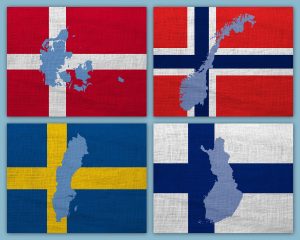What at first glance looks like an innocuous statement may on closer inspection turn out to be yet another indication of how Taiwan’s political autonomy is gradually being eroded. On its webpage listing “Danish representations in China,” the Danish Ministry of Foreign Affairs includes the Trade Office in Taipei as one of its four missions in China (the list includes Beijing, Guangzhou, Shanghai, and Taipei). Officially, since 1950 the Danish government has recognized the People’s Republic of China as the sole legal government of China (i.e. the One China policy) without taking any position on Taiwan’s political status.
The designation of the Taipei trade office as based in China may of course be dismissed as a blunder, yet similar examples suggest otherwise. For instance, in November 2021, Chinese Foreign Minister Wang Yi, following a bilateral meeting with his Danish counterpart Jeppe Kofod, said that he “appreciates Denmark’s adherence to the one-China principle” (i.e. that “Taiwan is an inalienable part of the PRC”). The Danish MFA refrained from issuing any public correction. When confronted by a Danish newspaper, the MFA merely stated that they had reminded Beijing about Denmark’s official position.
Although Denmark, Finland, Iceland, Norway, and Sweden, have all publicly declared their adherence to the One China policy in the past decade, the vagueness of this policy and the cautiousness of their approaches have put the Nordic governments on the defensive in the face of Chinese encroachments as Beijing seeks to impose its One China principle. Examples are plentiful in the other Nordic countries as well. In both Iceland and Norway, the Chinese ambassadors have made deliberately excessive claims about their host countries’ support for an “undivided China” and “the fact that Taiwan is part of China,” without prompting any public response from Reykjavik and Oslo. Meanwhile in Finland and Sweden, some governmental agencies have come under pressure to abandon their categorization of Taiwan as “Republic of China,” with the Swedish Tax Agency now referring to “Taiwan, province of China.”
Importantly, the vague and unspecified character of the One China policy makes it very difficult for the Nordics to counter Beijing’s growing assertiveness. While this ambiguity previously served the Nordic governments well by increasing the flexibility in managing their relations with Taiwan, it has now become a double-edged sword that conversely enables China to make inroads by exploiting its leverage in other domains. It means that until the Nordic governments clarify their position – ultimately by rejecting the One China principle – they will find themselves struggling to address questions such as how to refer to Taiwan, how to classify Taiwanese citizens, how to interact with the Taiwanese authorities, how to ensure Taiwan’s functional participation in the international community, etc.
By shying away from such questions, the Nordics are not part of the group of so-called “vanguard countries” that are most supportive of Taiwan in Europe. Indeed, two of the Nordic states – Iceland and Norway – can more aptly be referred to as “laggards,” having completely isolated themselves from Taiwan with no direct channels of institutionalized bilateral interaction. In Norway’s case, the government terminated its trade office in Taipei in 2004, seemingly froze out the local Taiwanese representative (who eventually left Norway in 2017) and even changed the nationality on Taiwanese students’ residence permits to “Chinese.” In late 2022, the Norwegian foreign minister observed during a rare interpellation regarding Taiwan ties in the Norwegian parliament that “Our needs for representation and exchange of information are covered by our embassy in Singapore.”
The other three Nordic countries – Denmark, Finland, and Sweden – can be described as commercial pragmatists in terms of the practical arrangement of their non-official relations with Taiwan. They operate low-key trade offices in Taipei alongside Taiwanese representative offices in their own capitals for the sake of promoting economic interests. In addition, both Finland and Sweden regularly engage in bilateral trade talks with the Taiwanese (at the level of under-secretary and state secretary, respectively).
It would seem that Sweden stands out within the Nordic family given the Swedish Riksdag’s indefatigable efforts in the past few years to place Taiwan on the political agenda. Meanwhile, no less than 25 Swedish MPs have visited Taiwan in the past two years (compared to one Finnish, one Norwegian and no Danish or Icelandic MPs). This pro-Taiwan activist spree can, to some extent, be explained by China’s coercive diplomacy against Sweden during 2017-21, which has generated extremely negative views of China in Sweden. However, as long as the government in Stockholm does its utmost to curb or ignore Taiwan-related proposals from the Riksdag, Sweden can hardly be viewed as one of the European “vanguard countries” like Czechia and Lithuania.
As small liberal democracies that pride themselves on supporting like-minded countries, the Nordics’ support for Taiwan should be a no-brainer to some observers. But given the hyper-sensitivity of the Taiwan issue and Beijing’s intimidating arsenal of coercive instruments, the Nordic countries have instead adopted a defensive, even detached, stance. Nevertheless, at this present juncture when a daunting array of “peak China” challenges seems to have put the Chinese government on the back foot, the Nordics could roll up their sleeves and reengage the Taiwanese more actively as they did back in the 1990s.
After all, a double-edged sword cuts both ways.
You can view the full report, “Much Ado, Little Afoot? How the Nordics Approach Taiwan,” from the Danish Institute for International Studies (DIIS) here.

































